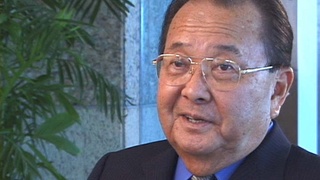インタビュー
ベトナムでの兵役の影響
帝国主義や植民地主義という考えは、私にはまったく理解できませんでした。ベトナムに行く前に、そういったことをすべて聞いていました。そして、周りを見回すと、軍隊は解放のためではなく支配のための力として、それが私の周りにあったことに気づきました。それが軍隊での私の経験でした。そして、私は今、公然と、私たちがベトナムという国を傷つけ、彼らの社会やコミュニティを分裂させ、あの戦争、暴力、人種差別に加担し、ベトナムに不必要な残虐行為や殺人をもたらし、今日に至るまで南北間の傷が癒えていないことに対して謝罪します。私はただ謝罪します。このすべてのことにおいて私が担った役割について、そしてこのようなことをするのが私の義務であると考えるほど愚かだったことについて謝罪します。ベトナムは私にとって、その教訓を表しています。私が覚えているのは、国を出て反戦運動に参加したくてたまらなかった、出て行ってようやく何かを言えるようになりたかったということです。そして、繰り返しますが、それは私の雇用主に悪影響を及ぼさないでしょう。それで私はそうしました。そしていろいろな意味で、つまり、人々は私を、特に私の職業である弁護士業では、いつも「怒っているアジア人弁護士」と形容することが多いと思います。私はそのように形容され、人々は私をある種、そのように分類しますが、同時に、何かが起こると、人々が何かを言わなければならないようなことを言います。私はそれを言い、その結果は受け入れますが、私は自分の見解を述べるつもりです。そして、もし私が「狂った怒っているアジア系アメリカ人女性」と呼ばれてしまったら、それはそれで構いません。なぜなら、時々私は腹を立てるからです。それは本当です。しかし、私はいつも、もし私がこのことで怒っていないのなら、あなたは何が悪いのか、と感じます。
日付: 2020年7月14日
場所: 米国、カリフォルニア州
インタビュアー: マシュー・サイトウ
提供: 全米日系人博物館、ワタセ・メディア・アーツ・センター; Japanese American Bar Association










